Top 5 Signs Your Locks Need to Be Replaced
/in Uncategorized /by Anthony LimpertYour locks serve as the first line of defense against intruders, but over time, they can become worn out, outdated, or damaged, putting your home or business at risk. At First Class Locksmith, we provide expert lock replacement services to ensure your property remains safe and secure. Here are the top five signs that it may be time to replace your locks.
1. Your Locks Are Worn Out or Rusty
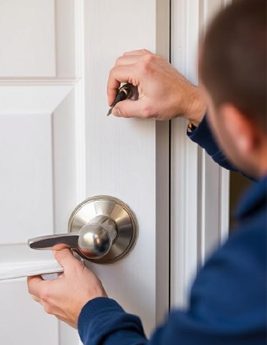 Locks endure constant use, exposure to weather, and dirt buildup, leading to wear and tear. If your key is hard to turn, the lock sticks, or there is visible rust, your lock may fail when you need it most.
Locks endure constant use, exposure to weather, and dirt buildup, leading to wear and tear. If your key is hard to turn, the lock sticks, or there is visible rust, your lock may fail when you need it most.
Solution: Upgrade to a new, durable lock with First Class Locksmith’s expert replacement services.
2. You’ve Had a Break-In or Attempted Burglary
If your property has been broken into, intruders may have tampered with or damaged the locks. Even if the lock still functions, it may have been compromised, making your home or business an easy target.
Solution: Replace compromised locks immediately with high-security options to prevent future break-ins.
3. You Moved into a New Home or Business Location
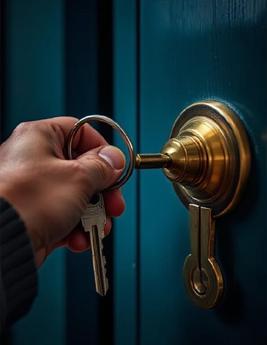 When moving into a new home or office, you never know who still has copies of the old keys. Previous owners, tenants, contractors, or employees may have access.
When moving into a new home or office, you never know who still has copies of the old keys. Previous owners, tenants, contractors, or employees may have access.
Solution: Replace or rekey your locks to ensure only you and authorized individuals have access.
4. Your Locks Are Outdated or Low-Security
If your home or business still has basic, traditional locks, they may not provide the protection you need. Older locks can be easily picked, bumped, or broken, leaving your property vulnerable.
Solution: Upgrade to modern locks, such as high-security deadbolts, electronic locks, or smart locks for better security.
5. You’ve Lost Your Keys or They Were Stolen
If your keys are missing, there is a chance they could be in the wrong hands. Even if you find them later, someone may have made copies.
Solution: Replace the locks or rekey them to eliminate security risks.
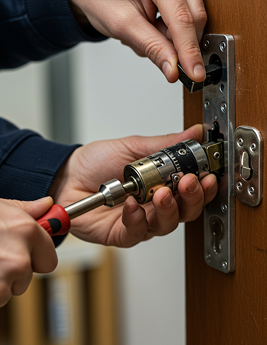
Protect Your Home & Business with First Class Locksmith
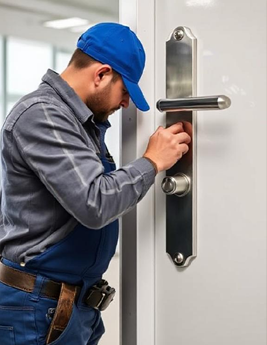 If you notice any of these signs, it is time to upgrade your locks. First Class Locksmith offers:
If you notice any of these signs, it is time to upgrade your locks. First Class Locksmith offers:
- Fast and professional lock replacement
- Residential and commercial lock upgrades
- High-security and smart lock installations
Call us today to schedule your lock replacement and keep your property safe.
Kwikset Locks: A Reliable Choice for Home and Business Security
/in Uncategorized /by Anthony LimpertWhen it comes to securing your home or business, choosing the right lock is essential. Kwikset locks are one of the most recognized and trusted brands in the industry, offering a combination of durability, innovation, and affordability. Whether you need a standard deadbolt, a high-security lock, or a keyless entry system, Kwikset provides solutions for every security need.
At First Class Locksmith, we offer expert installation, repair, and replacement services for Kwikset locks to ensure your property remains protected. Let’s explore why Kwikset locks are a popular choice and how they can enhance your security.
Why Choose Kwikset Locks?
Kwikset has been manufacturing locks for over 70 years and is known for its commitment to innovation and security. Here are some key reasons why home and business owners trust Kwikset locks:
1. Variety of Locking Mechanisms
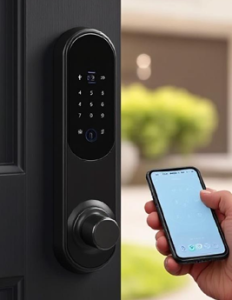 Kwikset offers a wide range of locks, including:
Kwikset offers a wide range of locks, including:
- Deadbolts – Traditional, single-cylinder, and double-cylinder deadbolts for enhanced security.
- Smart Locks – Keyless entry and app-controlled locks for modern convenience.
- Electronic Locks – Keypad locks that eliminate the need for physical keys.
- Lever Locks – Ideal for interior and exterior doors with added style and security.
2. SmartKey Security Technology
Kwikset’s SmartKey Security technology allows homeowners to rekey their locks quickly without replacing the entire lock. This feature is beneficial if you lose a key, experience a break-in, or need to change access without professional assistance.
3. Affordable and Durable
Compared to other high-security locks, Kwikset locks provide excellent durability at a more budget-friendly price. They are built with tamper-resistant features and pick-resistant cylinders to enhance protection.
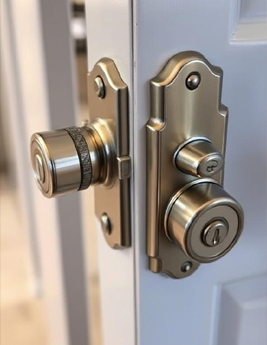
4. Easy Installation and Compatibility
Kwikset locks are designed for easy installation, making them compatible with most standard doors. Whether you need to replace an old lock or upgrade to a smart lock system, Kwikset makes it simple.
5. Advanced Smart Lock Technology
Kwikset’s Halo, Premis, and Kevo smart locks allow users to control their locks remotely using smartphone apps. These smart locks integrate with home automation systems, offering keyless access, remote locking/unlocking, and activity tracking for added convenience and security.
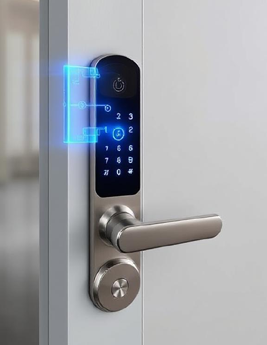
Best Kwikset Locks for Homes and Businesses
If you are considering installing a Kwikset lock, here are some of the best options:
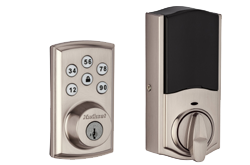
1. Kwikset SmartCode 888
A great choice for homeowners looking for a keypad entry system with one-touch locking and SmartKey Security.
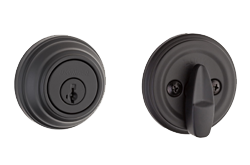
2. Kwikset 980 Deadbolt
A high-security ANSI Grade 1 deadbolt, offering maximum strength against forced entry.
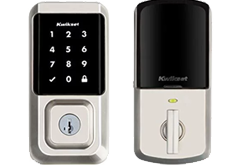
3. Kwikset Halo Smart Lock
A Wi-Fi-enabled smart lock that allows remote control and access via the Kwikset app.
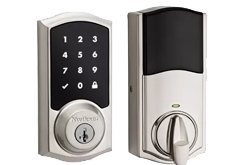
4. Kwikset Premis
Designed for Apple HomeKit users, this smart lock allows seamless integration with Siri voice commands.
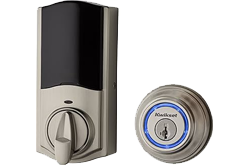
5. Kwikset Kevo Touch-to-Open
A Bluetooth-enabled lock that allows you to unlock your door with a simple touch when your smartphone is nearby.
Professional Kwikset Lock Installation and Services
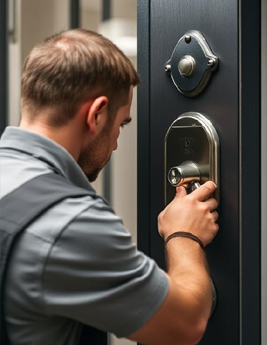 At First Class Locksmith, we specialize in:
At First Class Locksmith, we specialize in:
- Kwikset lock installation for homes and businesses
- Kwikset lock rekeying for enhanced security
- Smart lock setup and integration
- Kwikset lock repairs and replacements
If you need Kwikset lock installation or repair services, our expert locksmiths are here to help.
Call us today for professional assistance!
Understanding Rekeyable Locks: SmartKey Technology and Its Advantages
/in Uncategorized /by Anthony LimpertIn an age where home security innovations are more accessible than ever, finding the right balance between convenience and peace of mind can be challenging. Traditional locks have served us well for centuries, but new advancements, specifically rekeyable locks are changing the way we approach home and business security. One of the leading developments in this area is SmartKey Technology.
If you’ve ever had to replace or rekey your locks after misplacing a key, moving into a new home, or ending a roommate arrangement, you know the process can be time-consuming and costly. Rekeyable locks streamline that experience. Let’s explore what SmartKey Technology is, how it works, and why it might be a game-changer for your security needs.
What Is SmartKey Technology?
 SmartKey Technology is a proprietary feature found in certain locks (notably offered by brands like Kwikset) that allows you to rekey your lock quickly and easily without removing it from the door. Unlike traditional locks that require a locksmith to disassemble the cylinder to change the key pins, SmartKey-equipped locks let you reprogram the internal mechanism to accept a new key in a matter of seconds.
SmartKey Technology is a proprietary feature found in certain locks (notably offered by brands like Kwikset) that allows you to rekey your lock quickly and easily without removing it from the door. Unlike traditional locks that require a locksmith to disassemble the cylinder to change the key pins, SmartKey-equipped locks let you reprogram the internal mechanism to accept a new key in a matter of seconds.
How It Works:
- Initial Setup: When you install a SmartKey lock, it comes pre-set to a factory key.
- Rekey Process: To rekey, you use a special “SmartKey tool” along with your existing working key and the new key you want to program.
- Fast and Simple Steps: By following the lock’s instructions, you insert your current key and the SmartKey tool, then remove them and insert your new key. This action realigns the internal wafers, instantly rekeying the lock to your new key combination.
This simple process allows homeowners and property managers to maintain control over who can access their property without the hassle and expense of a full lock change.
Advantages of Rekeyable Locks with SmartKey Technology
1. Quick and Easy Rekeying
 Traditional rekeying requires a locksmith to disassemble the lock cylinder, remove the pins, and arrange new pins to match a new key profile. SmartKey locks eliminate these steps. With the SmartKey tool and your new key, you can rekey a lock in under a minute, a perfect solution if you’ve lost keys, suspect a security risk, or simply wish to update keys after a change in occupants.
Traditional rekeying requires a locksmith to disassemble the lock cylinder, remove the pins, and arrange new pins to match a new key profile. SmartKey locks eliminate these steps. With the SmartKey tool and your new key, you can rekey a lock in under a minute, a perfect solution if you’ve lost keys, suspect a security risk, or simply wish to update keys after a change in occupants.
2. Cost-Effective Security Updates
Replacing locks each time you need to update keys can be expensive, especially if you have multiple entry points. SmartKey Technology saves money by allowing you to use the same lock hardware and simply reset the key. This is an ideal scenario for landlords who need to update keys between tenants, homeowners who’ve given out temporary keys to guests or contractors, or businesses that want a cost-effective way to maintain secure access.
3. Enhanced Key Control
 Physical keys can circulate more than you realize among family members, friends, babysitters, dog walkers, house cleaners, or contractors. Instead of collecting all these keys back or wondering if duplicates have been made, you can rekey your SmartKey lock whenever someone no longer needs access. This puts total control back in your hands and reduces the security risks associated with missing or duplicated keys.
Physical keys can circulate more than you realize among family members, friends, babysitters, dog walkers, house cleaners, or contractors. Instead of collecting all these keys back or wondering if duplicates have been made, you can rekey your SmartKey lock whenever someone no longer needs access. This puts total control back in your hands and reduces the security risks associated with missing or duplicated keys.
4. Strong Protection Against Lock-Bumping and Picking
SmartKey Technology isn’t just convenient, it’s also designed with security in mind. Many SmartKey locks feature advanced pinless locks or wafer-based designs, providing strong resistance to common forced-entry techniques like lock-bumping and picking. Coupled with solid construction and durable materials, these locks offer a higher level of security than many standard lock cylinders.
5. Versatility Across Multiple Entry Points
 If your home has several exterior doors, you can simplify your life by configuring all of them to work with the same key. Traditional locks might require hiring a locksmith to achieve this “keyed-alike” convenience, but with SmartKey, you can easily rekey each lock in minutes, ensuring a consistent key setup throughout your home or office.
If your home has several exterior doors, you can simplify your life by configuring all of them to work with the same key. Traditional locks might require hiring a locksmith to achieve this “keyed-alike” convenience, but with SmartKey, you can easily rekey each lock in minutes, ensuring a consistent key setup throughout your home or office.
6. Ideal for Short-Term Rentals and Small Businesses
For property managers, Airbnb hosts, or small business owners, controlling access is critical. SmartKey locks let you quickly update keys as guests or employees come and go, reducing downtime and security vulnerabilities. This flexibility makes it easy to maintain a secure environment without frequent professional interventions.
Common Misconceptions About SmartKey Locks
Myth 1: They’re More Complicated Than Traditional Locks.
While SmartKey locks feature advanced internal mechanisms, they’re designed for user-friendliness. The quick rekeying process is intuitive, guided by simple instructions and the use of a dedicated SmartKey tool.
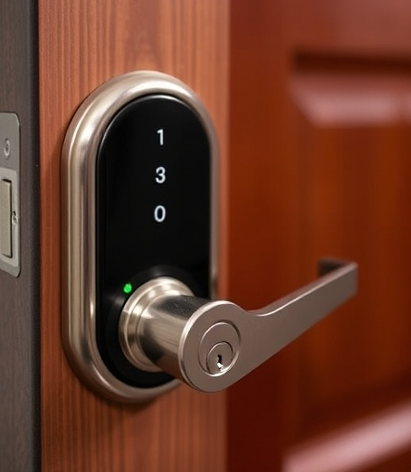
Myth 2: Rekeying Compromises Security
In fact, SmartKey Technology is engineered to maintain security during the rekeying process. The lock must be in the unlocked position, and you must have the current working key to rekey it. This ensures that unauthorized parties can’t just walk up and change the lock’s key combination.
Myth 3: All Rekeyable Locks Are the Same.
Not all rekeying systems are identical. SmartKey locks, for example, have a patented design that provides superior protection against drilling and picking compared to many traditional locks. Research the brand and model to ensure you’re getting a reputable product.
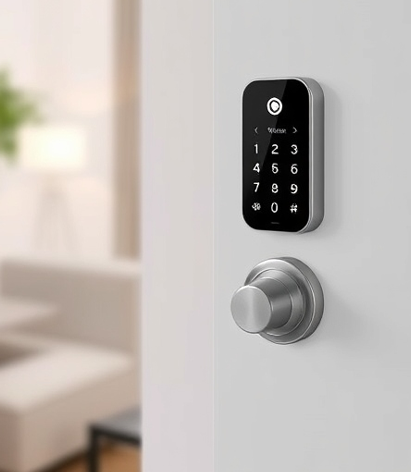
Considerations Before Upgrading to SmartKey Lock
1. Existing Hardware:
If you’re happy with your current locks or recently invested in high-security deadbolts, consider the costs and benefits of upgrading. While SmartKey might save money long-term, ensure the initial investment makes sense for your situation.
2. Lock Grade and Security Needs:
Different lock brands and models vary in their level of security. SmartKey is convenient, but also look at the lock’s ANSI/BHMA grade to ensure it meets your property’s security requirements. High-traffic doors or areas requiring heightened security may benefit from Grade 1 locks, which offer maximum durability and resistance.
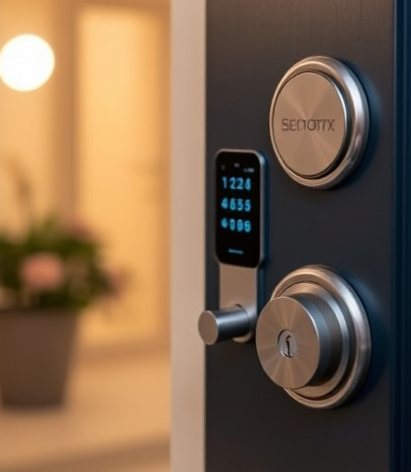
3. Professional Consultation:
If you’re unsure whether SmartKey Technology suits your home or business, consult with a trusted locksmith. They can assess your current hardware, recommend brands, and help ensure a seamless installation.
Maintaining Your SmartKey Locks
 Proper care extends the life and reliability of any lock, and SmartKey locks are no exception:
Proper care extends the life and reliability of any lock, and SmartKey locks are no exception:
- Periodic Lubrication: Use a graphite-based lubricant periodically to keep internal parts moving smoothly.
- Gentle Handling of Keys: Avoid using keys as tools for prying or twisting objects. This prevents bent keys that can damage internal lock components.
- Routine Inspections: If you notice any sticking or difficulty turning the key, address it early. Sometimes a quick cleaning or lubrication can prevent bigger issues down the road.
Conclusion: Is SmartKey Technology Right for You?
Rekeyable locks featuring SmartKey Technology represent a leap forward in convenience and flexibility, making it easier than ever to adapt your security to changing needs. Whether you’re a homeowner wanting peace of mind after a move, a landlord managing multiple tenants, or a small business looking to streamline access control, SmartKey locks offer a practical and cost-effective solution.
Need help choosing or installing a SmartKey lock? Contact First Class Locksmith today. Our experienced technicians can guide you through product selection, ensure proper installation, and provide tips for maximizing your new lock’s lifespan and security. With the right tools and knowledge, upgrading to rekeyable locks can be a seamless step toward a more secure and convenient future.
Key Maintenance Tips: How to Extend the Life of Your Locks and Keys
/in Uncategorized /by Anthony LimpertLocks and keys are fundamental to our daily security, yet we often overlook their care until something goes wrong. Just as you’d service a car or perform routine maintenance on appliances, giving a bit of attention to your locks and keys can prevent frustrating lockouts, expensive repairs, and compromised security.
In this guide, we’ll explore practical tips to help you keep your locks and keys functioning smoothly for years to come. With just a few proactive steps, you can reduce wear and tear, maintain reliability, and ensure that your doors remain secure.
1. Keep Your Keys Clean and Dry
 Why It Matters:
Why It Matters:
Keys pick up dirt, lint, and moisture from pockets, purses, and everyday use. Over time, debris can transfer to your lock’s internal mechanisms, causing friction and hindering smooth operation.
What to Do:
- Wipe Down Keys Regularly: Use a soft cloth to remove dust or residue. If your keys are visibly dirty, a gentle rinse with warm, soapy water followed by thorough drying is a simple solution.
- Avoid Harsh Chemicals: Stick to mild cleaning solutions. Strong chemicals can corrode metal and damage protective finishes.
2. Lubricate Your Locks Appropriately
 Why It Matters:
Why It Matters:
Locks consist of intricate pins, springs, and internal components that must move freely. Without proper lubrication, they can become stiff, increasing the risk of key breakage or lock failure.
What to Do:
- Use a Graphite-Based Lubricant or Lock-Specific Spray: Unlike oils, which can attract dirt and gum up, graphite or silicone-based lubricants are designed for locks. Apply sparingly—just a quick spray or a puff of graphite powder is enough.
- Annual Maintenance: Lubricate your locks every 6-12 months, or more often if you live in a dusty or humid environment like Houston. A short, routine lubrication can add years to your lock’s life.
3. Handle Keys with Care
 Why It Matters:
Why It Matters:
Keys aren’t designed to withstand heavy force. Using them as makeshift tools—like prying open packages or acting as a bottle opener—can bend or weaken them, making it more likely they’ll snap off in a lock.
What to Do:
- Use Keys Only for Their Intended Purpose: Reserve that energy for dedicated tools. If a lock is sticking, don’t force the key—address the root cause instead.
- Avoid Excess Weight on Your Keychain: A large bundle of keys and accessories adds stress to your car’s ignition and can wear down house keys. Keep it simple and streamlined.
4. Store Spare Keys Wisely
 Why It Matters:
Why It Matters:
Spare keys are a safety net, ensuring you have access if you lose your primary set. However, poor storage can lead to damage, rust, or unauthorized access.
What to Do:
- Use a Protective Case or Holder: Keep spare keys in a dry, indoor location. If you store them outside, consider a weatherproof lockbox.
- Check Spare Keys Periodically: Even unused keys can collect dust and moisture. Examine spares every few months and clean or dry them if needed.
5. Address Issues Early
 Why It Matters:
Why It Matters:
A lock that’s getting harder to turn or a key that feels “off” is often a cry for help. Ignoring small issues can lead to broken keys, jammed locks, and emergency callouts at inconvenient times.
What to Do:
- Don’t Force a Key: If it won’t turn smoothly, stop and investigate. Try cleaning the key, lubricating the lock, or checking for visible damage.
- Call a Professional Before It’s Urgent: If lubrication and basic cleaning don’t solve the problem, contact a reputable locksmith. A quick, non-emergency repair can save you from costly fixes down the road.
6. Protect Locks from the Elements
 Why It Matters:
Why It Matters:
Locks on exterior doors, gates, or sheds face constant exposure to humidity, dust, rain, and temperature fluctuations. These conditions can accelerate wear, rust, and corrosion.
What to Do:
- Use Weather-Resistant Locks: If you live in a humid climate or near the coast, invest in locks designed to withstand the elements.
- Apply Rust Inhibitors: Occasional treatment with rust inhibitors or specialized lock protectants can prolong the life of locks exposed to weather extremes.
- Install Protective Hardware: Consider adding a door awning or a shield to keep rain and direct sunlight off the lock.
7. Invest in Quality Locks and Keys
 Why It Matters:
Why It Matters:
The old saying “you get what you pay for” applies to locks and keys. Cheaper, low-quality locks often wear out faster, offering less security and demanding more frequent repairs.
What to Do:
- Choose Reputable Brands: Opt for well-known lock manufacturers like Schlage, Kwikset, or Medeco. These brands offer reliable hardware tested against rigorous standards.
- High-Quality Keys: Getting your keys cut at a reputable locksmith ensures precise duplication. Poorly cut keys can damage lock mechanisms over time.
8. Reconsider Lock Upgrades Periodically
 Why It Matters:
Why It Matters:
As locks age, the internal mechanisms can wear out even with the best care. Plus, security standards evolve over time, and upgrading may prevent future issues and enhance safety.
What to Do:
- Upgrade to High-Security Options: Consider high-security locks or smart locks if your current hardware shows signs of wear.
- Schedule Inspections: A professional locksmith can assess your current locks, recommend preventive maintenance, and advise when a replacement might be more cost-effective than continual upkeep.
10. Have a Trusted Locksmith on Speed Dial
 Why It Matters:
Why It Matters:
Even well-maintained locks and keys can fail unexpectedly. Having a trustworthy locksmith ready to assist ensures you’re never left stranded.
What to Do:
- Research in Advance: Look for a licensed, insured locksmith with positive local reviews. Save their contact information for emergencies.
- Regular Check-Ins: Establishing a relationship with a local locksmith means you can schedule routine maintenance and get advice on prolonging the life of your locks and keys.
Conclusion: A Little Care Goes a Long Way
Locks and keys work hard every day, silently securing your home, belongings, and loved ones. By investing just a bit of time in cleaning, lubrication, and proper handling, you can significantly extend their lifespan. Preventive measures, quality hardware, and occasional professional attention can help avoid unnecessary hassles, costs, and security risks.
For professional advice, routine maintenance, or quick repairs, contact First Class Locksmith. Our team of experienced technicians is dedicated to keeping your locks and keys in top shape, so you can enjoy the peace of mind that comes with well-maintained security.
Rekeying vs. Replacing Your Locks: Which Option is Right for You?
/in Uncategorized /by Anthony LimpertYour locks are the first line of defense in protecting your home or business. But over time, you may encounter situations that prompt a change. Maybe you’ve lost a key, moved into a new home, or experienced a security breach. When it comes to addressing these concerns, two common choices emerge: rekeying your existing locks or replacing them entirely. Understanding the differences, benefits, and costs of each option can help you decide which path best aligns with your needs.
What Does Rekeying Involve?
Definition: Rekeying a lock means adjusting the internal components—specifically the pins and tumblers—so the lock can be operated by a new key. It does not replace the lock itself; instead, it alters the locking mechanism inside the existing hardware.
Process: A locksmith will remove the lock cylinder, rearrange the pins, and issue you a new key that matches the updated configuration. The old keys will no longer work, effectively giving you control over who has access without changing the hardware on your door.
Pros of Rekeying:
 More Affordable: Rekeying typically costs less than installing all new locks since you’re not paying for new hardware.
More Affordable: Rekeying typically costs less than installing all new locks since you’re not paying for new hardware.- Maintains Current Hardware: If you like your existing lock fixtures or recently invested in quality locks, rekeying keeps that investment intact while updating security.
- Quick and Convenient: Rekeying is usually a faster process than full replacement and can often be done on-site in a single visit.
When to Consider Rekeying:
- You’ve Moved into a New Home: After taking ownership of a new home, rekeying ensures that former occupants, contractors, or real estate agents can no longer gain entry.
- Lost or Stolen Keys: If you’ve lost your keys or suspect they’ve been stolen, rekeying is a quick and cost-effective way to restore security.
- Consolidating Keys: If you have multiple locks that require different keys, a locksmith may be able to rekey them to work with a single master key—simplifying your life.
What Does Rekeying Involve?
 Definition: Replacing locks means removing your existing lock hardware—knobs, handles, deadbolts—and installing entirely new units.
Definition: Replacing locks means removing your existing lock hardware—knobs, handles, deadbolts—and installing entirely new units.
Process: A locksmith or qualified installer removes the old lock and fits a new one in its place. This often involves ensuring the door frame, strike plate, and bolt align properly. Upgrading to high-security or smart locks is also simpler during a full replacement.
When to Consider Replacing Locks:
- Old or Damaged Hardware: If your locks are outdated, heavily worn, or frequently malfunctioning, replacement ensures reliable operation and enhanced security.
- Upgrading Security Features: If you want to invest in high-security locks, electronic keypads, or smart lock technology, a full replacement is often the best route.
- Aesthetic Changes: If you’re renovating your home or office and want modern fixtures that match your new décor, replacing locks can deliver both style and security.
Pros of Replacing Locks:
 Increased Security Options: With a lock replacement, you have the freedom to choose from a wide range of modern lock types, finishes, and advanced features.
Increased Security Options: With a lock replacement, you have the freedom to choose from a wide range of modern lock types, finishes, and advanced features.- Enhanced Durability: New locks come with fresh components that are less prone to wear and tear, ensuring smooth operation for years to come.
- Complete Peace of Mind: Knowing you have brand-new hardware provides confidence that your door’s first layer of security is up to current standards.
Rekeying vs. Replacing: Factors to Consider
Definition: Replacing locks means removing your existing lock hardware—knobs, handles, deadbolts—and installing entirely new units.
Process: A locksmith or qualified installer removes the old lock and fits a new one in its place. This often involves ensuring the door frame, strike plate, and bolt align properly. Upgrading to high-security or smart locks is also simpler during a full replacement.
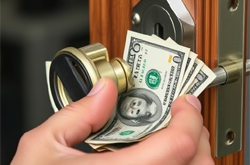
1. Cost
- Rekeying: Generally more budget-friendly, as you’re only paying for a service call and new key pins.
- Replacing: Higher initial cost, since you’ll pay for new lock sets and installation fees.
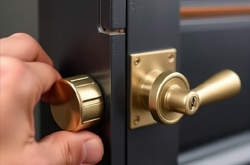
2. Hardware Quality
- Rekeying: A good choice if your current locks are in excellent shape and you simply want to ensure no unauthorized keys exist.
- Replacing: Perfect for those who have aging, poor-quality locks, or who want to upgrade to premium hardware.
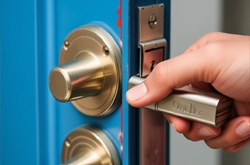
3. Security Needs
- Rekeying: Addresses immediate security concerns (lost or stolen keys) without major changes to your setup.
- Replacing: Offers an opportunity to upgrade to high-security locks, anti-bump/deadbolt features, or smart locking solutions.

4. Aesthetics and Technology
- Rekeying: Maintains the current appearance and function of your locks.
- Replacing: Lets you match new locks to updated home décor or integrate smart technology for convenience and remote access.
Common Scenarios
 Scenario 1: Just Moved into a New Home
Scenario 1: Just Moved into a New Home
- Recommendation: Rekey the existing locks for peace of mind and cost-effectiveness.
Scenario 2: Worn-Out Deadbolt That Sticks Constantly
- Recommendation: Replace the lock with a higher-quality or modern lock to improve functionality and security.
Scenario 3: Desire for a Smarter Entry System
- Recommendation: Replace your existing locks with a smart lock system that offers keyless entry, remote control via smartphone, or voice command integration.
Scenario 4: Lost Your Keys Recently
- Recommendation: Rekey your locks to prevent unauthorized access by anyone who might find the old keys.
Consult a Professional Locksmith
 When in doubt, seek professional guidance. A licensed, insured locksmith can assess the condition of your locks, discuss your security goals, and recommend the best solution—whether that’s rekeying, replacing, or even a combination of both. With professional expertise on your side, you can make an informed decision that aligns with your budget, taste, and long-term peace of mind.
When in doubt, seek professional guidance. A licensed, insured locksmith can assess the condition of your locks, discuss your security goals, and recommend the best solution—whether that’s rekeying, replacing, or even a combination of both. With professional expertise on your side, you can make an informed decision that aligns with your budget, taste, and long-term peace of mind.
Conclusion
Choosing between rekeying and replacing your locks doesn’t have to be a daunting decision. By considering factors like cost, desired security level, and overall condition of your current hardware, you can find the best solution for your home or business. Rekeying is a convenient, cost-effective way to enhance security without changing your hardware, while replacing locks gives you the freedom to upgrade both security and aesthetics.
Need help deciding or ready to take action? Contact First Class Locksmith today. Our experienced technicians are here to help you secure your space, one lock at a time.
How to Prevent Home Lockouts: Practical Tips for Busy Families
/in Uncategorized /by Anthony LimpertFor many of us, life in Houston moves at a fast pace-morning school drop-offs, evening soccer practices, grocery runs, and work meetings packed into a tight schedule. In the midst of this daily rush, getting locked out of your home can throw a major wrench into your plans. Fortunately, with a bit of forethought and a few simple measures, you can significantly reduce the chances of a home lockout.
In this guide, we’ll explore practical, family-friendly strategies to help ensure that everyone in the household can come and go without those frustrating, time-consuming lockouts.
1. Establish a “Key Zone” Inside Your Home
Why It Matters: When you’re juggling multiple responsibilities-managing homework schedules, prepping meals, and coordinating carpools-it’s easy to misplace keys. One of the most effective ways to prevent lockouts is to create a consistent place for your keys.
When you’re juggling multiple responsibilities-managing homework schedules, prepping meals, and coordinating carpools-it’s easy to misplace keys. One of the most effective ways to prevent lockouts is to create a consistent place for your keys.
What to Do:
- Designate a Specific Spot: Choose a highly visible area near the door you use most frequently. This could be a small hook, a decorative bowl on a side table, or a dedicated tray on a wall-mounted shelf.
- Make It a Habit: Encourage every family member to hang their keys immediately upon entering the house. Children can learn this routine early, just like hanging up their coats.
- Add a Visual Reminder: Consider placing a small sign or a colorful sticker near the designated spot as a visual cue to help everyone remember to return their keys after use.
2. Rely on Keychains and Lanyards
 Why It Matters:
Why It Matters:
Keys are small, and in a busy household, things tend to disappear under piles of mail, backpacks, or laundry. By making your keys more noticeable, you reduce the risk of losing them.
What to Do:
- Opt for Bright and Bulky Keychains: Choose a keychain that’s large, colorful, or has a distinctive shape. A neon tag or a fuzzy pom-pom can make your keys stand out.
- Attach Keys to a Lanyard: If you’re constantly on the move, wearing your keys on a lanyard around your neck or clipped to a bag strap can help ensure they’re always within reach.
3. Create Spare Keys-and Store Them Wisely
 Why It Matters:
Why It Matters:
Accidents happen. Even the most organized families may experience moments of forgetfulness. Having a spare key is a simple insurance policy.
What to Do:
- Duplicate Your House Keys: Have at least one spare key for your home’s main entrance. If several family members drive, you may need multiple copies.
- Use Lockboxes or Smart Key Safes: Rather than hiding a key under a doormat or potted plant-common places thieves know to check-invest in a lockbox or a Bluetooth-enabled key safe. Mount it somewhere discreet, and only share the combination with family members or trusted neighbors.
- Give a Spare Key to a Trusted Neighbor or Friend: Choose someone who lives nearby and is often at home. This can provide quick rescue in case of unexpected lockouts.
4. Embrace Keyless Entry Systems
 Why It Matters:
Why It Matters:
Smart locks and keyless entry systems are a game-changer for busy families. They eliminate the need for physical keys altogether, reducing the risk of lockouts significantly.
What to Do:
- Install a Smart Lock: Modern smart locks let you unlock your door using a numeric code, smartphone app, or even biometric identification (like a fingerprint).
- Set Multiple Access Codes: Assign unique PINs to each family member. If Grandma visits often, give her a temporary code. If you need a dog walker to enter, create a code that’s active only during certain hours.
- Integrate with Smart Home Systems: Connect your lock to platforms like Amazon Alexa, Google Assistant, or Apple HomeKit. Voice commands or scheduled automations can lock or unlock the door at your convenience.
5. Keep Your Locks in Good Condition
 Why It Matters:
Why It Matters:
Worn-out or poorly maintained locks can lead to keys getting stuck or breaking. This not only increases lockout risk but can also lead to costly repairs.
What to Do:
- Regular Lubrication: Apply a graphite-based lubricant or a designated lock spray every 6-12 months to keep internal components functioning smoothly.
- Check for Wear and Tear: If your key is getting harder to turn, the lock feels loose, or you notice corrosion, it’s time for a professional inspection or replacement.
- Professional Maintenance: Schedule periodic visits from a reputable locksmith to ensure your locks are secure and efficient. Investing in routine maintenance can save you from emergencies later.
6. Develop a Family Lockout Plan
 Why It Matters:
Why It Matters:
Sometimes, even the best precautions fail. When that happens, it’s vital to have a plan so no one panics, especially kids.
What to Do:
- Discuss Plan with Family Members: Make sure everyone knows what to do if they find themselves locked out-who to call, where to wait, and how to stay safe if it happens late at night.
- Ensure Contact Information is Accessible: Keep the phone number of your trusted locksmith (like First Class Locksmith in Houston) easily accessible in a phone contact list or on a family bulletin board.
- Plan for Emergencies: If older kids have their own keys, ensure they have a charged phone and know the neighbors who can help in a pinch. Consider leaving a small emergency fund with a neighbor or friend to cover unexpected locksmith costs if you’re away.
7. Synchronize Schedules and Routines
 Why It Matters:
Why It Matters:
Lockouts often happen when family members aren’t on the same page-maybe Mom thought Dad had the keys, while Dad assumed their teenage son would be home to open the door.
What to Do:
- Share Calendars: Utilize a shared family calendar, whether it’s a physical one on the fridge or a digital app, to keep track of who leaves first in the morning or who returns last at night.
- Clarify Responsibilities: If one person consistently leaves first, make it their job to double-check the key situation. Another family member might handle checking that doors are locked before bedtime.
- Communicate in Real-Time: If you’re running late, shoot a text message or a quick call to let the rest of the family know, so no one ends up waiting outside.
8. Consider Installing a Secondary Access Point
 Why It Matters:
Why It Matters:
Many homes have multiple doors-front, back, or even a garage entry. If your primary entrance is compromised or keys are lost, having an alternate way in can be a lifesaver.
What to Do:
- Upgrade a Secondary Door with a Keypad Lock: Give yourself a backup plan by installing a keypad or smart lock on a side door. This ensures at least one entrance can be accessed without a physical key.
- Garage Entry System: If you have an automatic garage door opener with a keypad, memorize the code and keep it updated. This can serve as a backup entry point in emergencies.
9. Educate Your Kids on Lock Protocol
 Why It Matters:
Why It Matters:
Children can be forgetful, but teaching them about keys and lock safety early on can help prevent future lockouts.
What to Do:
- Make It Age-Appropriate: Younger kids can learn to always put keys back in the “key zone” or remember their personal door code for a smart lock. Teens can take on greater responsibility, such as carrying their own keys.
- Emphasize Safety: Ensure kids understand the importance of never hiding keys outside in obvious places or sharing access codes with strangers.
10. Know Your Locksmith
 Why It Matters:
Why It Matters:
Even with all these preventive measures, life can throw curveballs. Having a trustworthy, local locksmith in your contact list ensures help is always at hand if a lockout occurs.
What to Do:
- Research Reputable Locksmiths: Look for licensed, insured professionals with positive reviews and a strong community presence.
- Keep the Number Handy: Store the locksmith’s number in your phone and write it on a family emergency contact list.
- Ask About Emergency Services: Confirm that your locksmith provides 24/7 emergency help, so you’re never left stranded if a lockout happens outside regular business hours.
Conclusion: Being Prepared Brings Peace of Mind
Lockouts can disrupt your plans and cost you time, but they don’t have to be inevitable. By creating consistent routines, investing in the right tools and technology, and preparing for the unexpected, you can dramatically reduce the risk of finding yourself and your family locked out.
Remember, preventing lockouts isn’t just about keys and locks-it’s about streamlining your daily routine and ensuring everyone in your household knows what to do. With these practical tips, busy Houston families can stay in control and enjoy the confidence of easy, stress-free access to their homes.
If you ever need professional advice on preventing lockouts or require emergency locksmith assistance, don’t hesitate to reach out to First Class Locksmith. We’re here to help you keep your home accessible, secure, and ready for whatever the day brings.
10 Reasons to Hire a Licensed and Insured Locksmith in Houston
/in Uncategorized /by Anthony LimpertWhen you’re dealing with the security of your home, car, or business, the quality of your locksmith matters. With so many locksmiths out there, it can be tempting to choose one based solely on price or proximity. However, hiring a licensed and insured locksmith in Houston ensures that you’re not just getting any service-you’re getting professionalism, reliability, and peace of mind.
Here are ten compelling reasons to entrust your lock and key needs to a licensed and insured expert.
1. Verified Credentials and Professionalism
A licensed locksmith has gone through the necessary steps to meet industry standards and state regulations. This means they’ve demonstrated their knowledge, skills, and ethical practices, so you can trust that the person working on your locks is a genuine professional.

2. Adherence to State and Local Regulations
In Texas, professional locksmiths must adhere to various guidelines and obtain proper licensing. By choosing a licensed locksmith, you ensure compliance with local laws, reducing the risk of scams or subpar workmanship.
3. Insurance Coverage for Peace of Mind
Even the most skilled locksmith can face unexpected challenges. If any accidental damage occurs during the job, an insured locksmith can cover the costs, sparing you from unforeseen expenses and ensuring your property is protected.
4. Up-to-Date Training and Techniques
Licensing often requires ongoing education and adherence to the latest industry standards. A licensed and insured locksmith stays current with modern lock technologies, smart locks, and security systems—giving you access to innovative solutions that enhance your security.
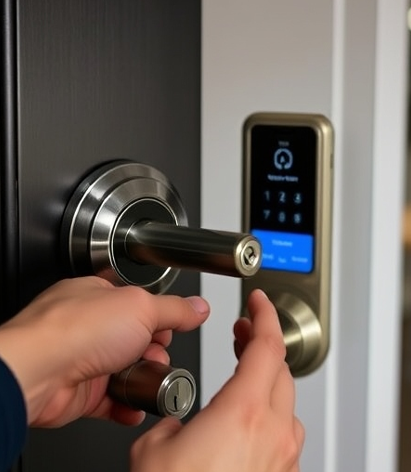
5. Reliable, High-Quality Work
Licensed locksmiths take pride in their reputation. They’re motivated to provide top-tier service every time, ensuring you receive professional craftsmanship and reliable results, whether you need a simple rekey or a more complex security upgrade.
6. Accountability and Customer Protection
When you hire a locksmith who is both licensed and insured, there’s a chain of accountability in place. Should any issues arise with the job, you have recourse through regulatory bodies or insurance claims, ensuring your concerns are taken seriously.
7. Faster Response Times and Local Expertise
Reputable locksmiths in Houston understand the urgency of lockouts and security issues. Most licensed locksmiths offer quick response times, 24/7 emergency services, and familiarity with the city’s neighborhoods, allowing them to reach you faster when you need help.
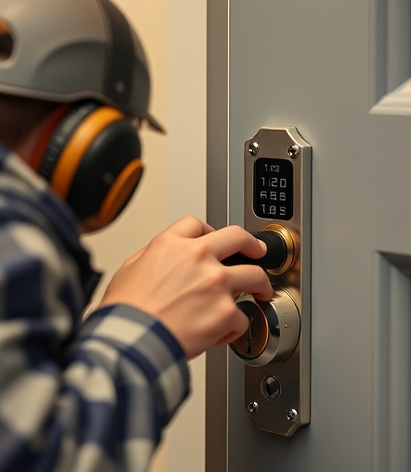
8. Transparent Pricing and No Hidden Fees
Licensed locksmiths value honesty and clarity. They typically provide upfront quotes with no hidden charges, so you know what you’re paying for before the work begins. This transparency helps you make informed decisions and avoid unpleasant surprises.
9. Broad Range of Services
From residential deadbolts to commercial access control systems, licensed locksmiths are trained to handle a wide spectrum of services. Because they invest in their professional growth, they can assist with rekeys, lock repairs, car key replacements, and even advanced high-security installations.
10. Confidence in Your Security
At the end of the day, locks are your first line of defense. By hiring a licensed and insured locksmith, you’re investing in confidence—confidence that your property is properly secured and that your locksmith will stand behind their work.
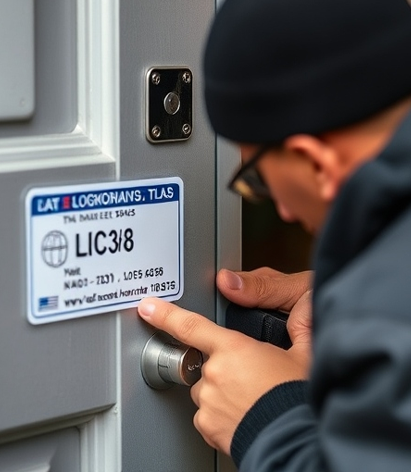
Conclusion
Your home, vehicle, and business deserve the highest level of protection, and that starts with the right professionals. A licensed and insured locksmith in Houston offers quality, accountability, and peace of mind that unlicensed service providers simply can’t match. When you’re ready to upgrade, repair, or reassess your security, contact a licensed and insured locksmith you can trust.
At First Class Locksmith, we meet all these standards and more. Contact us today to learn how we can help you safeguard what matters most.

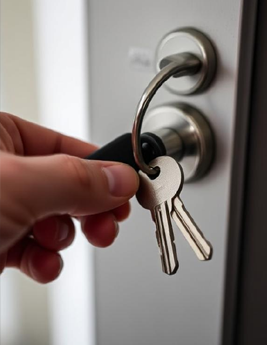
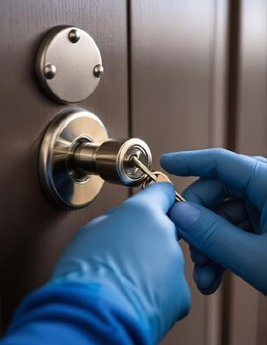
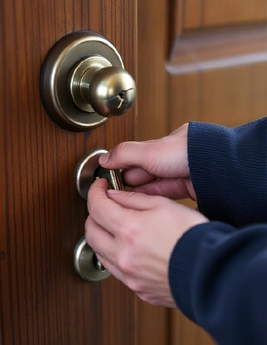




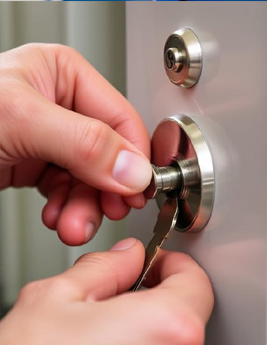 Whether you’ve just moved in or want to enhance your home security, First Class Locksmith is here to help. Our expert locksmiths can rekey your locks quickly and efficiently, ensuring your home is safe from unauthorized access.
Whether you’ve just moved in or want to enhance your home security, First Class Locksmith is here to help. Our expert locksmiths can rekey your locks quickly and efficiently, ensuring your home is safe from unauthorized access. 
